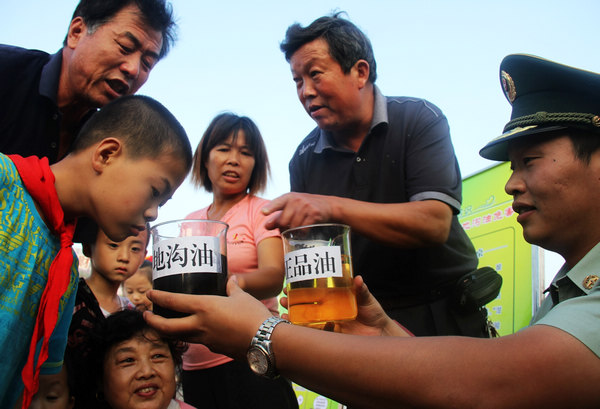Tests for gutter oil prove to be a failure
 0 Comment(s)
0 Comment(s) Print
Print E-mail
China Daily, October 14, 2011
E-mail
China Daily, October 14, 2011
A National Center for Food Safety Risk Assessment was established by the Ministry of Health and several central departments in Beijing on Thursday in the latest move to ensure food safety.
 |
|
Officers with the border defense detachment in Nantong, East China's Jiangsu province, show local residents on Sept 28 how to identify gutter oil. |
Meanwhile, the country's health and food safety watchdogs are continuing to seek an effective way to distinguish "gutter oil" from normal cooking oil, as none of the methods tried so far have proved satisfactory.
Illegally recycled cooking oil, or gutter oil as it is popularly known, is usually scooped up from the gutters and sewers behind cooking establishments, then clarified and resold to restaurants, but it can also be oil refined from low-quality pork, animal offal, and oil overused for fried food in a broader sense.
"The five detection methods proposed so far don't work in identifying the illegal oil and the authorities are still organizing experts to carry out research," Deng Haihua, spokesman for the Ministry of Health, said on Wednesday.
The ministry announced on Sept 18 that it was initiating a project with six central departments to develop better testing methods for gutter oil, and an expert panel was established to examine and verify the proposed methods.
Chen Junshi, an academician at the Chinese Academy of Engineering and a food safety expert, said the five alternatives were selected from all the potential detection methods gathered nationwide, but all were deemed ineffective.
"The panel made experiments with the proposed methods to differentiate gutter oil samples from ordinary edible oil, but none proved effective," Chen said.
The methods included detecting the four core indicators of gutter oil as defined by the Beijing Food Safety Monitoring Center - polycyclic aromatic hydrocarbon (PAH), cholesterol, conductivity and specific genes.
PAH, a carcinogen, has been confirmed as the greatest hazardous component in the illegal oil.
Although it has not been determined how carcinogenic the oil is, nutritionists have warned such oil can damage the gastrointestinal tract if consumed occasionally, and triggers cancers after long-term consumption.
"Animal and vegetable fat in refined waste oil will undergo rancidity, oxidation and decomposition after contamination, and produce toxic substances, such as arsenic. It will cause indigestion, insomnia, liver discomfort and other symptoms," said Zeng Jing, a nutrition expert at Guangdong Armed Police Hospital.
Experts said the failure to find a detection method once again shows that the safety of edible oil requires process monitoring.
"Law enforcement will only chase the tail of law breakers if the government only seeks to solve the problem technically, and fails to stop the illegal behavior happening," said Feng Ping, chief engineer at the China Meat Research Center.
"Even if an effective way to disqualify the illegal oil is found in two weeks, law breakers may still find new ways to meet the standards and conceal their product is illegal," Chen said.
This is the situation today.
"The illegal oil shows no difference in appearance and indicators after refining and purification because the law breakers are skillful at coping with the established standards," Feng said.





